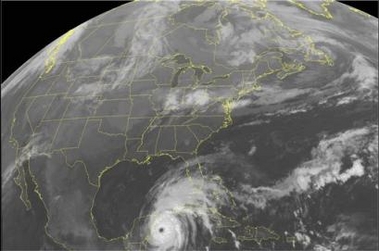
By WILL WEISSERT, Associated Press Writer

CANCUN, Mexico - Rain and rough surf battered Cancun's white-sand beaches as Hurricane Wilma inched toward a rendezvous with Mexico's most famous resort area. Thousands of stranded tourists hunkered down in shelters and hotel ballrooms amid warnings the storm could cause catastrophic damage.
Cuba evacuated more than 200,000 people in the face of the Wilma, which has already killed at least 13 people in Haiti and Jamaica. The hurricane is expected to sideswipe Cuba's tip – 130 miles east of Cancun – then swing to the right and head toward hurricane-weary Florida.
High winds from the Category 4 hurricane – once the most intense on record in the Americas – were already hitting the island of Cozumel, a popular stop for divers and cruise ship passengers, where hundreds of residents and 970 tourists were riding out the hurricane.
"The most important thing now ... is to protect lives, protect the lives of our children, of our grandparents," President Vicente Fox said in a broadcast address to the nation. "Possessions can be replaced."
Max Mayfield, director of the National Hurricane Center in Miami said Wilma has "the potential to do catastrophic damage" on the Yucatan Peninsula. With winds of 150 mph winds, Wilma is more powerful than Hurricane Katrina at the time it plowed into the U.S. Gulf Coast on Aug. 29, killing more than 1,200 people.
The National Hurricane Center in Miami said before dawn Friday that the storm's slow-moving, wobbly center was 55 miles southeast of Cozumel. The hurricane was moving toward the northwest at 6 mph, which was expected to bring the eye to shore by midday.
Forecasters said the storm could strengthen to a Category 5 hurricane before hitting land. Its slow progress delayed its expected arrival in Florida until early next week, but fueled fears that it would have more time to dump rain and pummel Mexico's low-lying Mayan Riviera, possibly causing major damage. The hurricane was expected to churn over land for nearly two days.
The hurricane's eye is so large it might take hours to pass over land, leading to fears that confused residents might leave shelters in the middle of the storm.
"The eye is very large, 65 kilometers across, and in those six or seven hours of apparent calm, people might get confused," said Quintana Roo Gov. Felix Gonzalez Cantu, whose state includes Cancun.
At the beachside Playa Azul hotel on Cozumel's north end, manager Martha Nieto said "the waves are getting very high." "We wish it would be over. The waiting drives you to desperation," Nieto said by telephone.
After airports closed late Thursday, desperate tourists who had lined up for hours in a failed bid to get on the last planes out were instead shuttled from luxury hotels to sweaty emergency shelters, or crowded into hotel ballrooms used as storm shelters.
About 20,000 tourists remained at shelters and hotels on the mainland south of Cancun, and an estimated 10,000 to 12,000 in the city itself.
Devon Anderson, 21, from Sacramento, Calif., said he was packed into a local school with other Americans, and that the army never arrived to board up the windows.
"There's no food, no water," he said. "We've pretty much just been deserted."
Some, like 30-year-old Carlos Porta of Barcelona, Spain, were handed plastic bags with a pillow and blanket.
"From a luxury hotel to a shelter. It makes you angry. But what can you do?" he said. "It's just bad luck."
In Cancun, high winds bent palm trees and waves gobbled the city's white-sand beaches. Nearly 50 hotels were evacuated, leaving the normally busy tourist zone deserted.
Early Wednesday, Wilma became the most intense hurricane recorded in the Atlantic. The storm's 882 millibars of pressure broke the record low of 888 set by Hurricane Gilbert in 1988. Lower pressure brings faster winds.
With Florida the following target, Gov. Jeb Bush declared a state of emergency, and officials cleared tourists out of the exposed Florida Keys.
Across Florida's southwest coast, people put up shutters, bought canned goods and bottled water and waited in ever-growing lines at gas stations.
In Belize, a nation south of Mexico's Yucatan Peninsula, officials canceled cruise ship visits and tourists were evacuated from islands offshore.
Associated Press writers Curt Anderson in Naples, Florida; Vanessa Arrington in Havana, Cuba; Lisa J. Adams in Mexico City; and Fritz Faerber in Playa del Carmen, Mexico, contributed to this report.